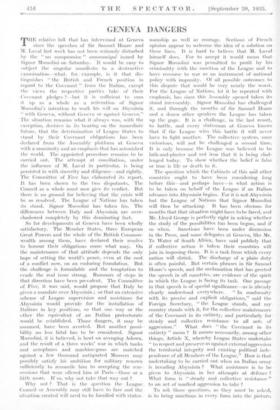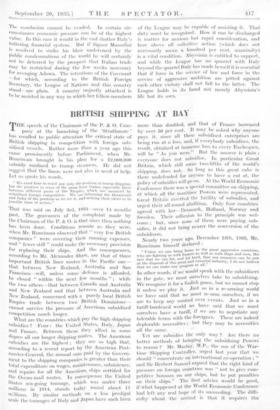GENEVA DANGERS
THE relative hill that has intervened at Geneva since the speeches of Sir Samuel Hoare and M. Laval last week has not been seriously disturbed by the • " no compromise " communique issued by Signor Mussolini on Saturday.. It would be easy to subject the singular manifesto to a destructive examination—what, for, example, is it that dis- tinguishes " the British and French position in regard to the Covenant " from the Italian, except the views the respective parties take of their Covenant pledges 7—but it is sufficient to sum it up as a whole as a reiteration of Signor Mussolini's intention to work his will on Abyssinia with Geneva, without Geneva or against Geneva." The situation remains what it always was, with the exception, decisive in its bearing on the immediate future, that the determination of League States to stand by their Covenant obligations has been declared from the Assembly platform at Geneva with a unanimity and an emphasis that has astonished the world. The appointed procedure remains to be carried out. The attempt at conciliation, under the influence of M. Laval in particular, is being persisted in with sincerity and diligence--7and rightly. The Committee of Five has elaborated its report. It has been shown to the two disputants. The Council as a whole must now give its verdict. But there is no ground for believing that the crisis will be so resolved. The League of Nations has taken its stand. Signor Mussolini has • taken his. The differences between Italy and Abyssinia are over- shadowed completely by this dominating fact.
So far developments at Geneva have been wholly satisfactory. The Member States, three European Great Powers and the whole of the British Common- wealth among them, have. declared their resolve to honour their obligations come what may. On the maintenance of that attitude depends , the only hope of setting the world's peace, even at the cost of ,a conflict now, on an enduring foundation. But the challenge is formidable and the temptation to evade the real issue strong. Rumours of steps in that direction have been prevalent. The Committee of Five, it was said, would propose that Italy be given a mandate over Abyssinia ; or that an extensive scheme of League supervision and .assistance for Abyssinia would provide for the installation of Italians in key positions, so that one way or the other the. equivalent of an Italian protectorate would be established. Those dangers, it may be assumed, have been averted. But another possi- bility no less fatal. has to be. considered. Signor Mussolini, it is believed, is bent on avenging Adowa, and the result of a three weeks' war in which, tanks and aeroplanes and machine-guns are matched against a few thousand antiquated Mausers may possibly satisfy his ambition for military renown sufficiently to reconcile him to accepting the con- cessions that were offered him at Paris—those or 'a little more. If so, why not take that way out ?
Why not ? That is the question the . League Council or Assembly. may still have to face and the situation created will need to be handled with states- manship as well as courage. Sections of French opinion appear to welcome the idea of a solution on these lines. It is hard to believe that M. Laval himself does. For to accept it would mean that Signor Mussolini was permitted to profit by his criminality with the sanction of the League and to have recourse to war as an instrument of national policy with impunity. Of all possible .outcomes to this dispute that would be very nearly the worst. For the League. of Nations, let it be repeated with emphasis, has since this Assembly opened taken its stand irrevocably. Signor Mussolini has challenged it, and through the mouths of Sir Samuel Hoare and a dozen other speakers the League has taken up the gage., It is a challenge, in the last resort, to battle, and every statesman at Geneva knows that if the League wins this battle it will never have to fight another. The collective system, once victorious, will not be challenged a second time. It is only because the League was believed to be lath-and-plaster and not iron that it is being chal- lenged today. To show whether the belief is false or true is life or death to it.
The question which the Cabinets of this and other countries ought to have been considering long before this—and perhaps have—is what action is to be taken on behalf of the League if an Italian advance into Abyssinia begins. For it is not Abyssinia but the League of Nations that Signor Mussolini will then be attacking. It has been obvious for months that that situation might have to be faced, and Mr. Lloyd George is perfectly right in asking whether the study of the possibilities has been begun, and if so when. Sanctions have been under discUssion in the Press, and some delegates at Geneva, like Mr. Te Water of South Africa, have said publicly that if collective action is taken their countries will join in imposing them. It is a task from which every nation will shrink. The discharge of a- plain duty is often painful. But certain phrases in Sir Samuel Hoare's speech, and the acclamation that has greeted. the speech in all countries, are evidence of the spirit in which the League is facing its task. One passage in that speech is of special significance--as is already clearly understood everywhere. " In conformity with its precise and explicit obligations," said the Foreign Secretary, " the League stands., and my country stands with it, for the collective maintenance of the Covenant in its entirety, and particularly for steady and collective resistance to all acts of aggression." What does " the Covenant in its entirety " mean ? It means necessarily, among other things, Article X, whereby League States undertake " to respect and preserve as against external aggression the territorial integrity and existing political inde- pendence of all ,Members of the League." How is that undertaking to be carried out when an Italian, army is invading Abyssinia ? What assistance, is, to be, given to Abyssinia in her attempts at defence ? What form. is ." steady . and collective. resistance " to an act of marked aggression to take ?
To ask those questions, as they must, be asked, is to bring sanctious in every form into.. the picture. The conclusion cannot be evaded. In certain cir- cumstances economic pressure can be of the highest Value. In this case it would in the end shatter Italy's tottering financial system But if Signor Mussolini is resolved to strike his blow undeterred by the public condemnations of the world he will certainly not be deterred by the prospect that Italian trade may be restricted during the few weeks necessary for avenging AdoWa. The intentions of the Covenant ----for which, according to the British Foreign Secretary, the League of Nations and thiS country stand=are plain. A country unjustly attacked is to be assisted in any way in which her felloiv-members of the League may be capable of assisting it. That duty must be recognised. How it can be discharged is matter for anxious but rapid consideration, and here above all collective action (which does net necessarily mean a hundred per cent. unanimity) is a vital condition. Abyssinia is entitled to support, and while the League has no' quarrel with Italy beyond the quarrel Italy has made herself it is essential that if force in the service of law and force in the service of aggressive ambition are pitted against each other victory 'shall not fall to the latter. The League holds in its hand not merely Abyssinia's life but its • own.







































 Previous page
Previous page